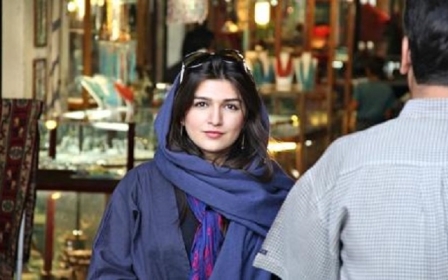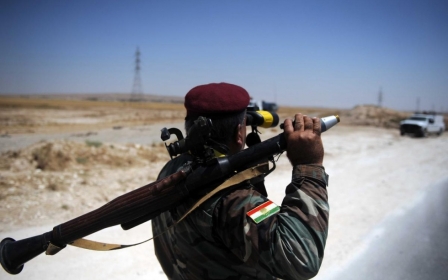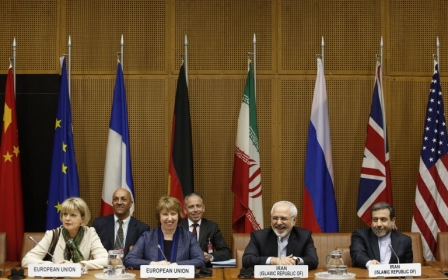Obama sends 'secret' letter to Khamenei over anti-IS collaboration

US President Barack Obama has written a secret letter to Iran's Supreme Leader Ayatollah Ali Khamenei, detailing a potential collaboration in the fight against the Islamic State, according to news reports.
According to the Wall Street Journal, who spoke to “people briefed on the correspondence”, Obama described the war on IS as a “shared fight” in the letter.
The correspondence, which is believed to be the fourth from Obama to Khamenei, follows indications this week that there may be a major breakthrough in the P5+1 nuclear negotiations with Iran tentatively agreeing to ship much of its uranium to Russia, according to news reports.
White House spokesman Josh Earnest refused to confirm or deny the report of the letter: "I’m not in a position to discuss private correspondence between the president and any world leader," he said.
Earnest repeated that on the sidelines of the P5+1 nuclear talks, Iran and the US had discussed the threat of the militants. He also reiterated the US stand that the country "will not cooperate militarily with Iran in that effort, we won’t share intelligence with them".
Diplomatic relations between the two countries collapsed following the 1979 Islamic revolution in Iran and the subsequent US embassy hostage crisis. The election of centrist candidate Hassan Rouhani as President of Iran in 2013 has led to a thawing of relations between the two countries and the first opening up of direct talks.
Now the two countries face a mutual enemy in IS with Iran, in particular, threatened by the group's anti-Shiite sectarianism and both countries have aided Iraq in combatting the group.
Many of Washington's regional allies, including Israel as well as Saudi Arabia, have been wary of the US administration bid to engage Iran diplomatically, and the Journal's sources said the White House did not tell those countries in advance of Obama's letter.
'Cornerstone of something much larger'
US Secretary of State John Kerry will Sunday meet with Iranian Foreign Minister Mohammad Javad Zarif as well as EU foreign policy chief Cathy Ashton in Oman, for a fresh round of nuclear talks.
Their meeting comes after a report this week in the New York Times that Iran had agreed to ship much of its uranium stockpile to Russia where it would be converted and unusable for nuclear weaponry.
One American “deeply involved” in the discussions told the paper that “if the Iran-Russia deal works, it could be the cornerstone of something much larger".
Another National Security Council official quotes in the report said that in spite of diplomatic tensions between Russia and the US, “it is accurate to say that the Russians have played a very helpful role during these negotiations".
“Despite differences of opinion on other foreign policy matters,” the official added, “Russia has remained completely unified with other countries in the negotiations.”
The agreement has been seen as a breakthrough in nuclear talks, which are still far from reaching an agreement in light of a 24 November deadline.
No extension of deadline
US Secretary of State John Kerry said on Wednesday that the deadline not be extended, should an agreement fail to be reached.
"We're not talking or thinking about going beyond that date. That is a critical date - we have no intention at this point of talking about an extension, and we're not contemplating an extension," Kerry told a press conference in Paris.
Asked if negotiations will become more complicated with Republicans controlling the House and the Senate, Kerry vowed that it will not change US government policy.
"No, I don't believe that changes either side. I honestly don’t. I believe that the same substantive issues would be there regardless of who is in control of the United States Senate," Kerry responded.
Earlier on Wednesday, Kerry and French Foreign Minister Laurent Fabius said that Iran has the right to operate a civil nuclear programme, but not create a bomb.
Fabius told reporters in a joint press conference with Kerry that they had agreed that Iran "definitely has the right to produce civil nuclear energy but not an atomic bomb".
He said it should be "easy" for Iran to prove that its nuclear programme is peaceful, taking into consideration that time was running out on Tehran's negotiations with world powers.
New MEE newsletter: Jerusalem Dispatch
Sign up to get the latest insights and analysis on Israel-Palestine, alongside Turkey Unpacked and other MEE newsletters
Middle East Eye delivers independent and unrivalled coverage and analysis of the Middle East, North Africa and beyond. To learn more about republishing this content and the associated fees, please fill out this form. More about MEE can be found here.




